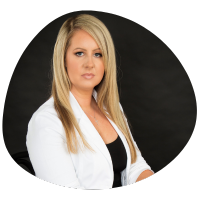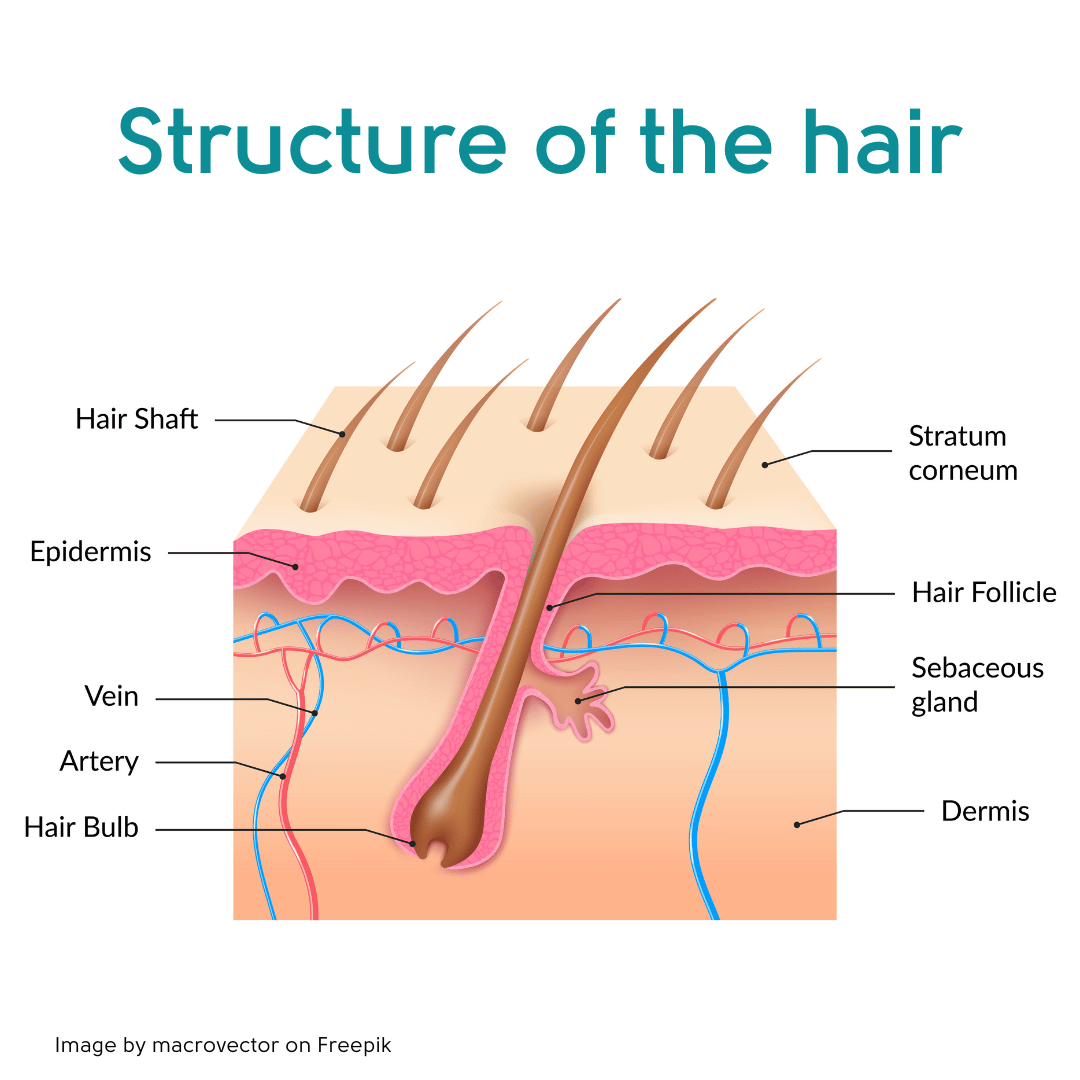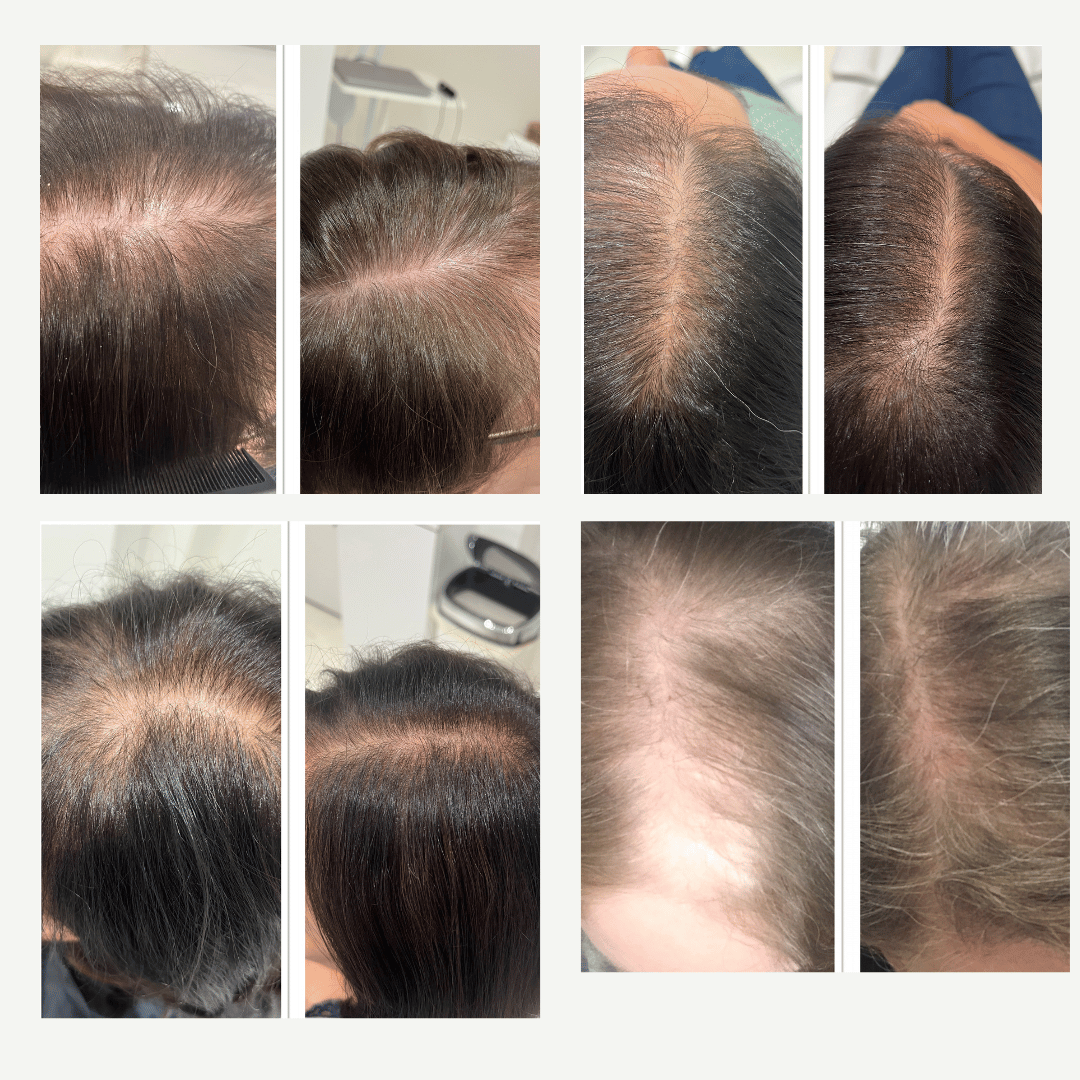Downloaded from www.mymenopausecentre.com
Direct URL: https://www.mymenopausecentre.com/blog/my-menopause-my-hair/
My menopause, my hair!
In this blog Trichologist Demi Griffiths talks about how the menopause affects hair and hair loss, what to look out for in terms of symptoms and the solutions that she recommends.

It’s all about oestrogen
As women transition through the menopause, their oestrogen levels fluctuate and ultimately decline, often causing a myriad of symptoms. For some women, one of these symptoms can be hair loss.
Oestrogen can be thought of as the hair-friendly hormone and it has two main roles when it comes to hair:
(1) It helps to elongate the hair growth cycle
The hair growth cycle has four main stages. These are the:
- anagen phase – the active growing phase
- catagen phase – the transitional phase
- telogen phase – the resting phase
- exogen phase – the release phase
Oestrogen helps to keep the hair in the anagen, the active growing phase of the cycle, for a longer time. If this part of the cycle is shortened, then generally you would see the hair shedding a little sooner than normal.
(2) It is also a follicle protector, protecting against testosterone
When oestrogen depletes, as it does during the menopause, the testosterone in the hair follicle becomes more prevalent. This then means that if the genetic predisposition to the hair loss condition androgenic alopecia (also known as female pattern hair loss) is present, it can then be triggered. A follicle is a tube-like structure that sits in the dermal part of the skin which houses the hair – see the illustration below showing the structure of the hair:
Different types of hair loss
Many women say to me ‘I think I have menopausal hair loss’, using this as a broad term, but it’s important to find out what type of hair loss they are experiencing. There are two main hair loss conditions that I see in my clinic that are triggered or caused by the menopause. These are telogen effluvium and androgenetic alopecia.
Telogen effluvium
Increased hair shedding in telogen effluvium is caused by a disturbance to the hair growth cycle. This disturbance causes the hair to prematurely move into the telogen phase of the growth cycle, resulting in hair shedding earlier than it normally would. This can be acute or chronic and in some acute cases, extreme amounts of hair are shed, for example when washing, brushing or simply touching the hair.
Telogen effluvium causes diffuse thinning, meaning that the hair’s density in general decreases making the hair feel thinner.
There can be many contributing factors to causes of telogen effluvium, and quite often multiple. These include stress, medication, nutrient deficiency, dietary factors such as fasting or crash dieting, and hormonal influences. This makes it super important to see a Trichologist to determine the cause, and investigate all avenues to be able to treat successfully.
Androgenetic alopecia
This is a hereditary condition that is more commonly known as female pattern hair loss.
A gene is passed on which is responsible for the conversion of normal testosterone to a more potent form called dihydrotestosterone (DHT). DHT causes hair follicles to shrink (miniaturise) over time producing not only finer hairs, but also fewer ones, and eventually the follicles die.
Female pattern hair loss is, sadly, permanent. That said, there are some incredibly effective treatments that not only slow down the condition, by saving as much hair as possible but also stimulate follicles to induce and encourage new growth. Treatment plans that are started earlier rather than later, give a better prognosis and can give amazing results. A little more detail on this is given later.
Symptoms to look out for
- Hair sheds more than usual
- Ponytail feels thinner or the general density of the hair feels less
- The scalp becomes more visible, particularly on the top area of the head
- The parting becomes wider
- Receding temples
- Hair strands feel finer
- The hair does not grow as long as it used to
You can also experience changes in the hair’s texture and condition. It may start to feel drier and more brittle and be more prone to breaking or snapping. The hair may also become more unmanageable and lose its volume and shine.
Treating telogen effluvium and androgenetic alopecia
Some of the most common treatments I offer in my clinic, and see great results with, are minoxidil, laser treatment and microneedling. A tailored supplement plan can also be a necessary and effective treatment for telogen effluvium along with dietary advice if there are any sub-optimal nutrient levels or deficiencies.
A treatment plan is always tailored to an individual. It is important to remember that not all treatments work for all conditions, and a patient’s medical history, medications and the severity of their condition are also taken into account.
Here are some results images from my patients:

HRT (Hormone Replacement Therapy)
As a Trichologist, I am not trained to advise women on HRT. HRT can improve menopause hair loss for some women but not for others, and it is not possible to predict who will respond to it. It is important to work closely with your GP or menopause specialist such as one of the doctors and nurses at My Menopause Centre to determine if HRT is right for you.
There are some helpful pieces of information however that can be given relating to hair, hair loss and HRT:
- Although oestrogen is the hair-friendly hormone, HRT can never exactly replicate the oestrogen levels to where they were before the menopause. The dose aims to help manage symptoms but may not be sufficient reverse hair loss. For this reason, HRT is not used as a hair loss treatment
- Positive effects it will have on the hair are that it may help to support growth, stabilise and protect
A Trichologist and hair stylist are the perfect combination team to help and guide you and your hair through your menopause journey. Look to using the correct products for your hair type and keep in mind that these will need to change to adapt to any changes in your hair. The right treatment plan really can work wonders for so many women.
Demi Griffiths is one of the Midlands leading Trichologists & owner of award-winning hair loss & scalp specialist clinic, Midlands Trichology. With over 25 years of experience in the field of hair, Demi has extensive knowledge & training in hair loss, hair loss treatments & scalp conditions. Demi graduated as a Trichologist achieving the level 4 ITECH certificate in Trichology, the only accredited Trichology course currently in the UK, & is also registered with the World Trichology Society.
Check out Davina McCall’s secrets for fabulous mid-life hair here.
Join the pause. community
We’ve created pause. as a space for women to come together and share stories about their menopause experience, ask questions, and to find support and inspiration. We'll also share the latest news and updates on the menopause from our experts.
Want to be the first to hear our latest news? Join our pause. community today.
Share your email to receive the latest news, updates and information on new products and treatments from My Menopause Centre and our pause. community. You can unsubscribe at any time.
We're committed to protecting and respecting your privacy - see our Privacy Policy and Terms and Conditions

Book a consultation
Whether you want to discuss your symptoms, create a treatment plan that's right for you, understand some test results or have a check-up, the highly experienced doctors and nurses in our menopause clinic are here to help you.
Book nowContact My Menopause Centre
- General enquiries: hello@mymenopausecentre.com
- Book appointments online: Log into your account and go to 'My appointments'
- Book appointments by phone: 0333 444 1067
- Website: https://www.mymenopausecentre.com



















We’d love to hear from you
Please ensure you’re logged in to leave a comment. Not got an account – registration is quick and easy! All comments are moderated prior to being posted on the website and are subject to our Acceptable Use Policy.
Comments